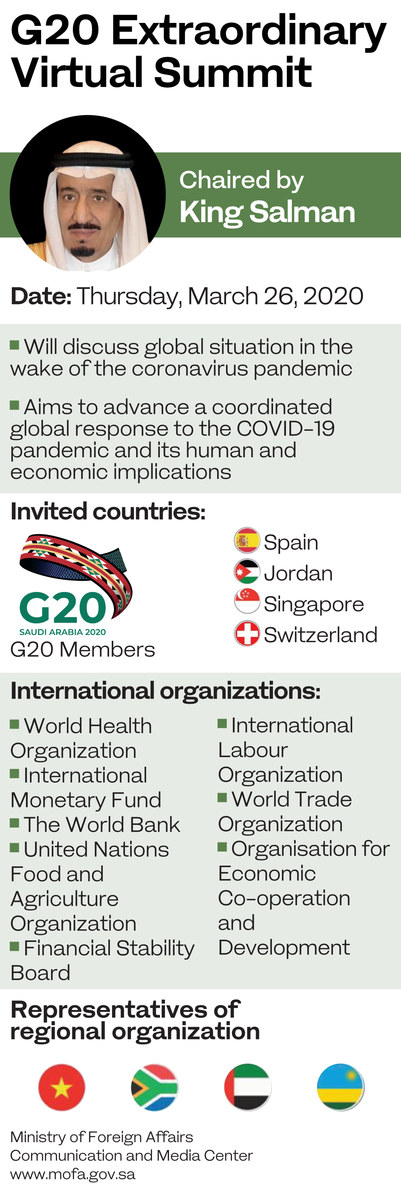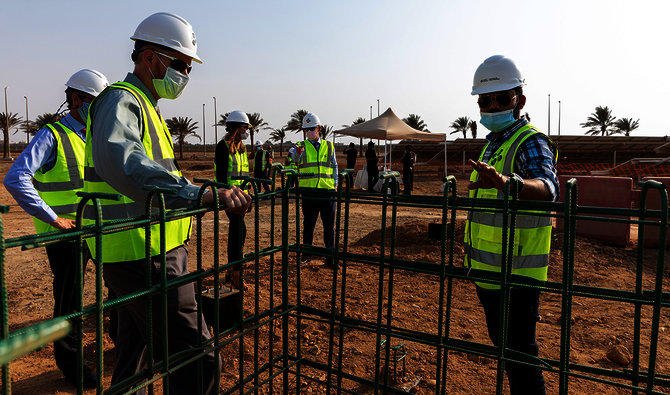DUBAI: Leaders of the most powerful countries in the world will today come together in a “virtual” summit organized by the Saudi Arabia G20 presidency to tackle the accelerating coronavirus crisis.
The two-hour digital forum will be opened by King Salman in Riyadh, but will take in all the world’s great capitals in an unprecedented attempt to face the global challenge presented by the virus to health and economic well-being.
An official statement said that King Salman would chair the meeting “to advance a coordinated global response to the COVID-19 pandemic and its human and economic implications.” He will also close the proceedings.
Among world leaders expected to participate in the meeting — which will be held behind closed doors as is customary with G20 plenary gatherings — are US President Donald Trump and Chinese President Xi Jinping, the world’s two biggest economies. Russian President Vladimir Putin and German Chancellor Angela Merkel will also take part.
Opinion
This section contains relevant reference points, placed in (Opinion field)
A communique and press release will be published after it ends. The “sherpas” — the officials who work behind the scenes to get agreement on the wording of the final document — are believed to have already had preliminary discussions.
The G20 is usually a once-a-year event, but two meetings were held in each year of 2009 and 2010, at the height of the global financial crisis. It is a mark of how seriously leaders regard the virus threat that they have agreed to an “extraordinary” summit ahead of the formal scheduled gathering in Riyadh in November.
A virtual halt to international air travel meant that a physical meeting was impossible, and Saudi Arabia’s Ministry of Communications, working at short notice in partnership with US technology giant CISCO, rushed to put in place the technical logistics for the event.
The G20 is made up of the 19 biggest national economies in the world, with the EU taking the 20th slot. In addition, Spain — one of the worst virus-affected nations in Europe — will also take part in the Riyadh “virtual” summit, as well as Jordan, Singapore and Switzerland. The UAE will be represented as chair of the Gulf Cooperation Council.
The World Health Organization, the UN, the International Monetary Fund and the World Bank are among the international organizations that will take part, as well as other development organizations.

The summit will be the first opportunity for global leaders to collaborate on the enormous challenges presented by the coronavirus. G20 summits aim for alignment of policy among the leaders, as well as an agreed collective response and concerted action.
So far in the economic response to the health emergency, governments around the world have spent an estimated $4.5 trillion on financial stimulus packages and economic assistance, the biggest being the $2 trillion in aid agreed by the US Congress this week.
China, the world’s largest economy, has so far refrained from large-scale financial or economic intervention. Some observers would like to see a change of direction by President Xi to coordinate with the US and Europe.
Given the situation with global energy markets — where the collapse of the OPEC+ agreement two weeks ago has led to a steep decline in oil prices and soaring supply of crude — some analysts expect the US to use the G20 to argue for a change of energy strategy by Saudi Arabia.
Michael Pompeo, the US secretary of state, said on Wednesday: “Saudi Arabia has a real opportunity to rise to the occasion and reassure global energy and financial markets when the world faces serious economic uncertainty.”
In a pre-summit statement, the IMF and the World Bank called on G20 countries to suspend repayments for less developed countries that get into difficulty as a result of the economic downturn. “We believe it is imperative at this moment to provide a global sense of relief for developing countries as well as a strong signal to financial markets.”
In the Middle East, economic analysts welcome the concerted financial and economic efforts the G20 would bring, but appealed for greater emergency funding for health programs.
Tarek Fadlallah, the Dubai-based chief executive of Nomura Asset Management, told Arab News: “It may reassure markets if we have a coordinated approach to tackling this global epidemic.”
Former Lebanon economics minister turned independent economics analyst, Nasser Saidi, said: “This is a reaffirmation of the importance of concerted global efforts. In a global health crisis we need to co-operate and share resources.”
Saudi Arabia’s efforts at global coordination will continue after the virtual summit. Another forum of G20 finance ministers and central bankers is planned for next month, as well as a virtual gathering of G20 health ministers.

































